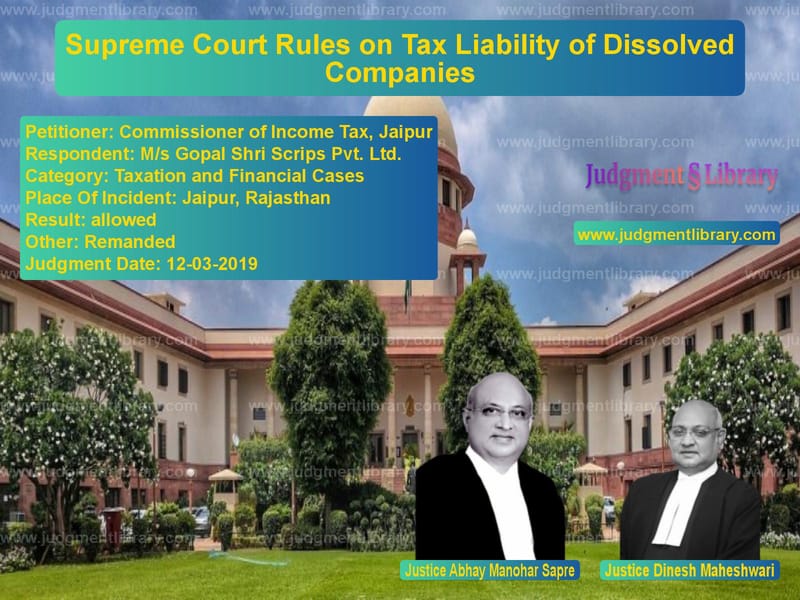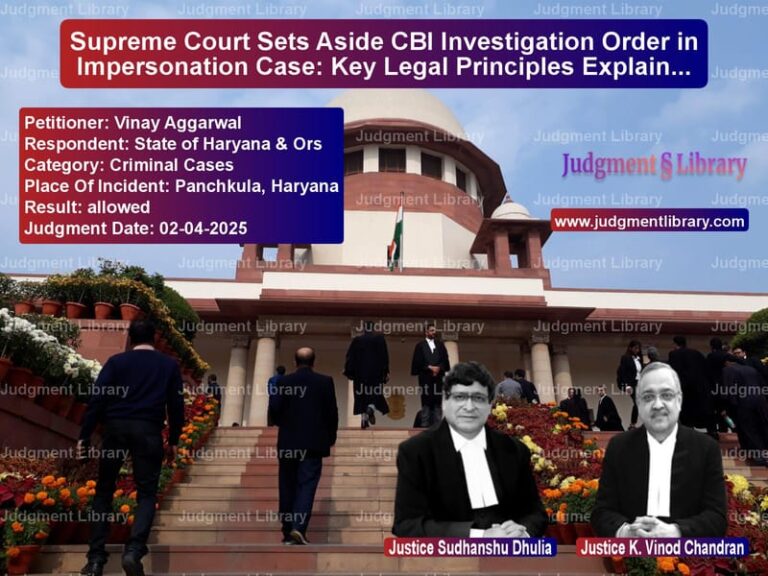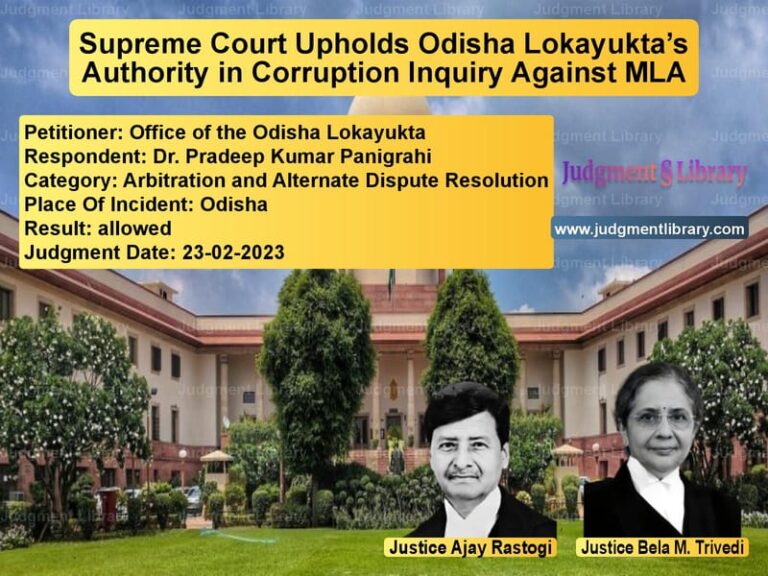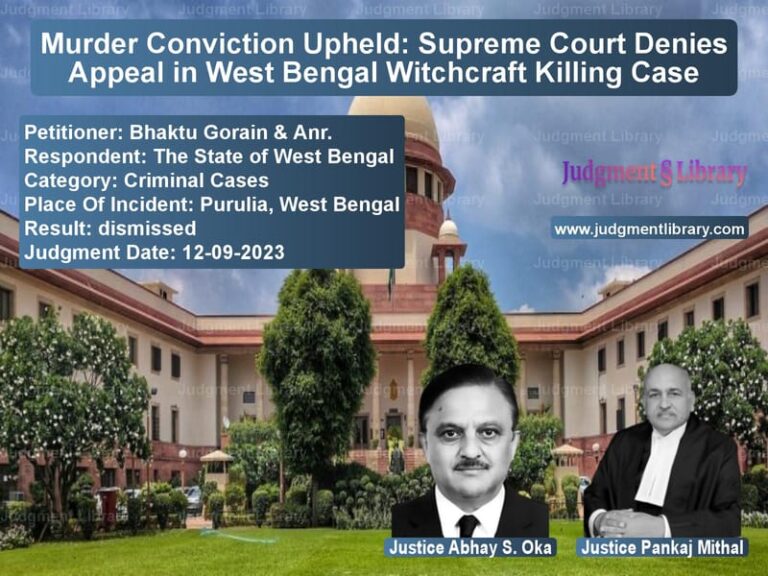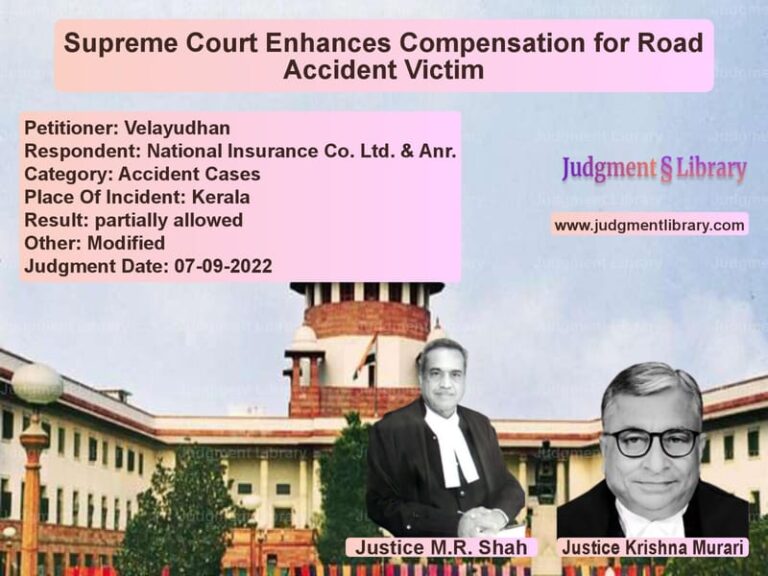Supreme Court Rules on Tax Liability of Dissolved Companies
The Supreme Court of India in Commissioner of Income Tax, Jaipur vs. M/s Gopal Shri Scrips Pvt. Ltd. ruled on a crucial tax dispute involving the liability of dissolved companies. The case involved the Income Tax Department’s appeal against an order of the Rajasthan High Court, which dismissed the case as infructuous due to the dissolution of the respondent company.
The Supreme Court set aside the High Court’s order, emphasizing that tax liabilities of dissolved companies do not automatically become infructuous and must be adjudicated as per the relevant provisions of the Companies Act, 1956, and the Income Tax Act, 1961.
Background of the Case
The appeal arose from an income tax dispute between the Union of India (Income Tax Department) and M/s Gopal Shri Scrips Pvt. Ltd. The dispute was pending before the Rajasthan High Court under Section 260-A of the Income Tax Act, challenging an earlier order of the Income Tax Appellate Tribunal (ITAT).
During the pendency of the appeal, it was brought to the High Court’s attention that the respondent company had been struck off the Register of Companies under Section 560(5) of the Companies Act, 1956. The High Court dismissed the appeal as infructuous, reasoning that since the company had been dissolved, there was no entity left to contest the appeal.
Petitioner’s Arguments (Income Tax Department)
The Income Tax Department, represented by the Additional Solicitor General, argued that:
- The tax liability of a dissolved company does not automatically extinguish upon its dissolution.
- The High Court failed to consider the relevant provisions of the Companies Act and Income Tax Act that govern the continuation of tax proceedings against dissolved entities.
- The appeal should not have been dismissed as infructuous without examining whether the liability could be enforced against the company’s directors, shareholders, or successors.
- The Companies Act and Income Tax Act contain provisions for dealing with the liabilities of dissolved companies, and the High Court should have adjudicated on the matter instead of dismissing the appeal.
Respondent’s Arguments (Gopal Shri Scrips Pvt. Ltd.)
The respondent, though served with notice, did not appear before the Supreme Court, leading the Court to decide the matter based on the petitioner’s submissions and legal provisions.
Supreme Court’s Observations
The Supreme Court ruled that the High Court had erred in dismissing the case as infructuous. The Court stated:
“The tax liability of a company does not automatically get extinguished upon its dissolution. The High Court should have examined the relevant provisions of the Companies Act and the Income Tax Act before dismissing the appeal.”
The Court referred to Chapter XV of the Income Tax Act, which deals with liability in special cases, particularly in situations involving discontinuance of business or dissolution.
Additionally, the Court highlighted that:
“The High Court failed to notice Section 560(5) proviso (a) of the Companies Act, 1956, which allows proceedings against a dissolved company for the purpose of enforcing liabilities.”
Final Judgment
The Supreme Court ruled as follows:
- The Rajasthan High Court’s order was set aside.
- The matter was remanded to the High Court for fresh adjudication on merits.
- The High Court was directed to examine the appeal in light of the relevant provisions of the Companies Act and the Income Tax Act.
- The Supreme Court refrained from making any observations on the merits of the tax liability, leaving it for the High Court to decide.
The Court concluded:
“Since the appeal is quite old, we request the High Court to decide the matter preferably within six months.”
Implications of the Verdict
This ruling has significant implications for taxation and corporate law in India:
- Clarifies Tax Liability of Dissolved Companies: The judgment establishes that tax disputes do not automatically become infructuous due to a company’s dissolution.
- Judicial Oversight on Tax Appeals: The ruling emphasizes that High Courts must examine tax disputes on merits rather than dismissing them on technical grounds.
- Strengthens Enforcement of Tax Laws: The decision ensures that corporate tax liabilities remain enforceable even after a company ceases to exist.
- Guidance for Future Tax Cases: The ruling sets a precedent for handling similar cases where tax claims are pending against dissolved companies.
By reinforcing the principle that dissolution does not nullify tax liabilities, this Supreme Court judgment strengthens the ability of tax authorities to enforce financial obligations against corporate entities.
Petitioner Name: Commissioner of Income Tax, Jaipur.Respondent Name: M/s Gopal Shri Scrips Pvt. Ltd..Judgment By: Justice Abhay Manohar Sapre, Justice Dinesh Maheshwari.Place Of Incident: Jaipur, Rajasthan.Judgment Date: 12-03-2019.
Don’t miss out on the full details! Download the complete judgment in PDF format below and gain valuable insights instantly!
Download Judgment: Commissioner of Inco vs Ms Gopal Shri Scrip Supreme Court of India Judgment Dated 12-03-2019.pdf
Direct Downlaod Judgment: Direct downlaod this Judgment
See all petitions in Income Tax Disputes
See all petitions in Tax Refund Disputes
See all petitions in Corporate Compliance
See all petitions in Judgment by Abhay Manohar Sapre
See all petitions in Judgment by Dinesh Maheshwari
See all petitions in allowed
See all petitions in Remanded
See all petitions in supreme court of India judgments March 2019
See all petitions in 2019 judgments
See all posts in Taxation and Financial Cases Category
See all allowed petitions in Taxation and Financial Cases Category
See all Dismissed petitions in Taxation and Financial Cases Category
See all partially allowed petitions in Taxation and Financial Cases Category

